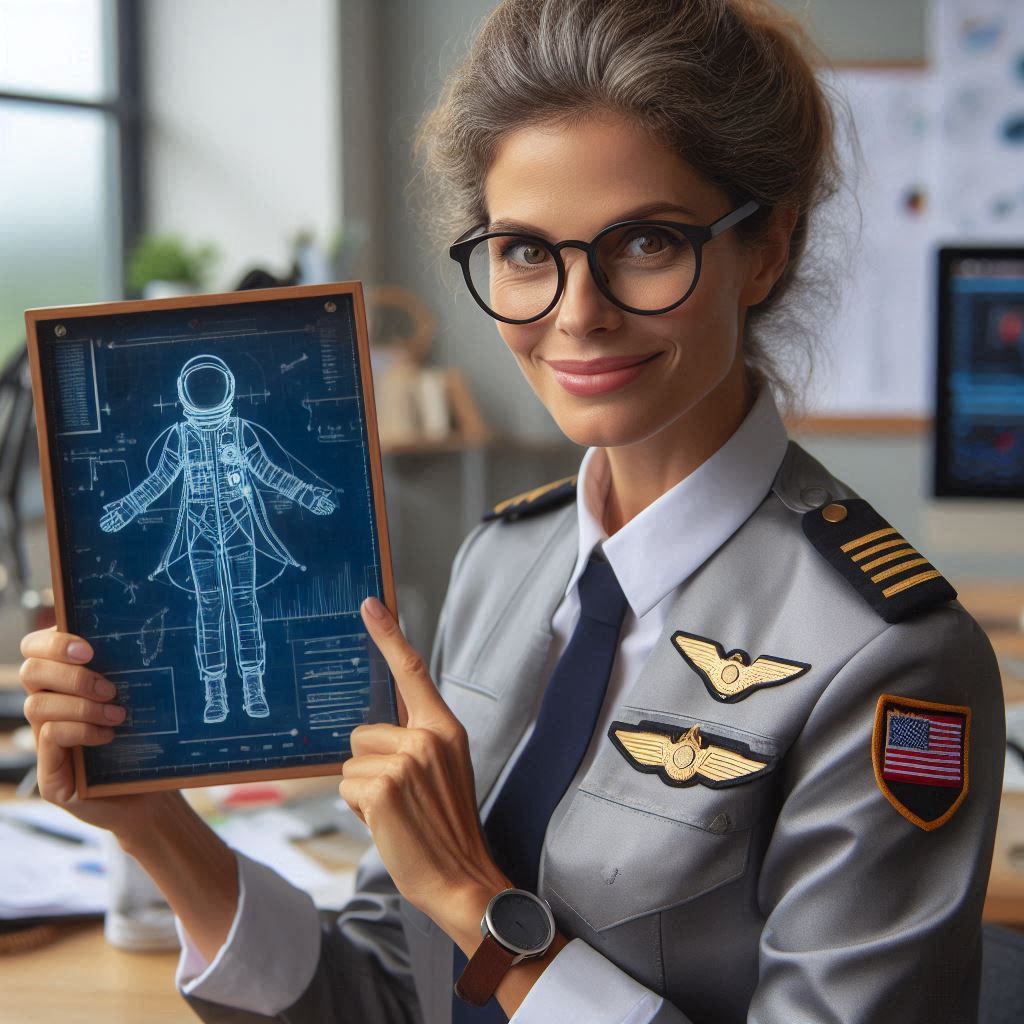Introduction
Certifications play a crucial role for aerospace engineers, ensuring they stay competitive and knowledgeable in a rapidly evolving field.
These credentials validate expertise, enhance career prospects, and provide a benchmark for professional standards.
In an industry where precision, safety, and innovation are paramount, having the right certifications can set an engineer apart from their peers.
Certifications demonstrate a commitment to continuous learning and professional growth.
They show that an engineer has met stringent industry standards and possesses up-to-date knowledge and skills.
This is especially important in aerospace engineering, where technological advancements and regulatory changes are frequent.
By obtaining certifications, engineers can stay current with the latest developments and maintain their relevance in the industry.
Several certifications are available in the aerospace field, each serving different specializations and career goals.
One of the most respected is the Certified Aerospace Engineer (CAE) credential.
This certification covers a broad range of aerospace engineering disciplines, including design, testing, and analysis.
It is ideal for engineers seeking to validate their comprehensive knowledge and skills.
Why Certifications Matter for Aerospace Engineers
Significance of Certifications in Showcasing Expertise and Knowledge
Certifications are pivotal in demonstrating expertise and knowledge in aerospace engineering.
They provide tangible proof of an engineer’s skills and qualifications.
In a competitive field like aerospace, certifications set professionals apart.
They show that an engineer has met industry standards and possesses specialized knowledge.
Earning certifications requires passing rigorous exams and meeting specific educational requirements.
This process validates an engineer‘s proficiency in various aerospace disciplines.
Certifications such as the Certified Aerospace Engineer (CAE) and Aerospace Systems Engineering Professional (ASEP) are highly regarded.
They reflect a deep understanding of aerospace systems, safety protocols, and regulatory compliance.
Certifications also highlight an engineer‘s commitment to professional development.
They show that an engineer is dedicated to staying current with industry advancements.
This commitment is crucial in aerospace engineering, where technology and regulations evolve rapidly.
Holding a certification demonstrates an ongoing investment in one’s career and expertise.
How Certifications Can Enhance Career Prospects and Credibility
Certifications significantly enhance career prospects and credibility.
They can open doors to advanced roles and higher salaries.
Employers often prefer certified professionals for specialized positions.
Certifications provide a competitive edge in the job market, making candidates more attractive to potential employers.
Certified engineers frequently gain access to exclusive job opportunities.
Many aerospace organizations require specific certifications for advanced positions.
For example, the FAA Designated Engineering Representative (DER) certification is essential for roles involving aircraft certification and regulatory compliance.
Without such certifications, accessing these specialized roles may be challenging.
Certifications also boost credibility within the industry.
They establish an engineer‘s expertise and dedication to their field.
Being certified provides assurance to employers and clients that the engineer meets high professional standards.
It builds trust and fosters a reputation for reliability and competence.
Furthermore, certifications often lead to increased professional recognition.
They enable engineers to join professional organizations and participate in industry events.
Networking with other certified professionals can open new career opportunities and provide valuable industry insights.
Certifications help engineers stay connected and relevant within the aerospace community.
In general, certifications play a crucial role in showcasing expertise and knowledge.
They validate an engineer‘s skills and commitment to professional growth.
Holding certifications enhances career prospects by providing access to advanced roles and higher salaries.
It also boosts credibility and professional recognition.
Investing in certifications is a strategic move for aerospace engineers seeking to advance their careers and establish themselves as experts in their field.
Top Certifications for Aerospace Engineers
Certifications are crucial for advancing careers in aerospace engineering.
They validate expertise and enhance professional credibility.
Here‘s a list of popular certifications and their requirements.
Certified Aerospace Technician (CAT)
The Certified Aerospace Technician (CAT) certification is offered by the National Center for Aerospace & Transportation Technologies (NCATT).
This certification demonstrates proficiency in aerospace maintenance and repair.
CAT certification is ideal for those working with aircraft systems, components, and avionics.
Requirements
- Experience: Typically requires two years of experience in aerospace maintenance or a related field.
- Education: A high school diploma or equivalent is necessary. Formal training from an accredited institution is often preferred.
- Examination: Candidates must pass a comprehensive exam covering topics such as aircraft systems, avionics, and maintenance practices.
- Renewal: Certification must be renewed every five years, often through continuing education or re-examination.
Certified Aerospace Engineer (CAE)
The Certified Aerospace Engineer (CAE) certification is provided by the American Institute of Aeronautics and Astronautics (AIAA).
This certification signifies advanced knowledge and skills in aerospace engineering.
CAE certification is suitable for engineers involved in designing, testing, and evaluating aerospace systems.
Requirements
- Experience: Requires a minimum of four years of professional experience in aerospace engineering or a related field.
- Education: A bachelor‘s degree in aerospace engineering or a related field is essential. An advanced degree may enhance eligibility.
- Examination: Candidates must pass a rigorous exam focusing on aerodynamics, propulsion, structures, and systems engineering.
- Renewal: Certification requires renewal every three years, which can be achieved through professional development courses or work experience.
Project Management Professional (PMP)
Although not specific to aerospace engineering, the Project Management Professional (PMP) certification is highly valued.
It is provided by the Project Management Institute (PMI).
This certification demonstrates expertise in managing complex projects, including those in aerospace.
Requirements
- Experience: Requires at least three years of project management experience or five years for those without a degree.
- Education: A high school diploma or equivalent is needed. A bachelor‘s degree is preferred.
- Examination: Candidates must pass a detailed exam covering project management processes, methodologies, and best practices.
- Renewal: Certification must be renewed every three years through continuing education and professional development.
Six Sigma Green Belt Certification
Six Sigma Green Belt Certification, offered by various organizations, is valuable for aerospace engineers.
This certification focuses on process improvement and quality management.
Requirements
- Experience: No specific aerospace experience is required, but prior experience in process improvement is beneficial.
- Education: A bachelor‘s degree is generally preferred.
- Examination: Candidates must complete training and pass an exam on Six Sigma principles and methodologies.
- Renewal: Certification may require periodic updates or continuing education to maintain proficiency.
Certified Systems Engineering Professional (CSEP)
The Certified Systems Engineering Professional (CSEP) certification is provided by the International Council on Systems Engineering (INCOSE).
This certification is relevant for aerospace engineers involved in systems engineering.
Requirements
- Experience: Requires several years of experience in systems engineering.
- Education: A bachelor‘s degree in a relevant field is necessary.
- Examination: Candidates must pass an exam focusing on systems engineering principles, practices, and processes.
- Renewal: Certification needs to be renewed every three years through continuing education and professional development.
These certifications, such as CAT and CAE, significantly enhance aerospace engineers‘ credentials.
Each certification has specific requirements and focuses, catering to various professional needs.
Obtaining these certifications can advance careers and demonstrate expertise in the aerospace field.
Benefits of Obtaining Certifications
Advantages of Getting Certified
Certifications offer significant advantages for aerospace engineers, including increased job opportunities and higher salaries.
Earning a certification demonstrates commitment to the profession and a high level of expertise.
Certified professionals often find themselves in high demand due to their specialized skills and knowledge.
One major benefit of obtaining certifications is access to a wider range of job opportunities.
Many aerospace companies prioritize candidates with relevant certifications when hiring.
These companies seek professionals who can immediately contribute to complex projects and tasks.
Certifications signal to employers that candidates have the necessary qualifications and are dedicated to their field.
Higher salaries are another compelling advantage of certifications.
Certified aerospace engineers often command higher pay compared to their non-certified peers.
This is due to the specialized skills and knowledge that certifications validate.
Companies are willing to invest more in professionals who have proven their expertise through certification programs.
Certifications also enhance career advancement prospects.
They provide professionals with the credentials needed to pursue leadership and managerial roles.
Certified engineers are often considered for promotions and career growth opportunities.
The recognition associated with certifications can lead to faster career progression and increased responsibility.
Transform Your Career Today
Unlock a personalized career strategy that drives real results. Get tailored advice and a roadmap designed just for you.
Start NowHow Certifications Can Validate Skills and Expertise to Potential Employers
Certifications serve as a tangible validation of skills and expertise.
They provide concrete proof that professionals possess the specialized knowledge required for specific roles.
For potential employers, certifications are a clear indicator of a candidate‘s capabilities and dedication to their profession.
When hiring, employers look for certifications to gauge a candidate’s proficiency in certain areas.
Certifications like the Professional Engineer (PE) license or Certified Systems Engineering Professional (CSEP) are recognized benchmarks in the aerospace industry.
They signify that professionals have met rigorous standards and possess advanced skills.
Certifications also offer credibility in specialized fields.
For example, a Certified Aerospace Technician (CAT) demonstrates a technician’s proficiency in advanced aircraft systems.
Similarly, a Certified Quality Engineer (CQE) confirms expertise in aerospace quality management practices.
These credentials assure employers that candidates can handle complex and critical tasks.
Furthermore, certifications can differentiate candidates in a competitive job market.
They highlight a candidate‘s commitment to continuing education and professional development.
This proactive approach is appealing to employers who value ongoing learning and improvement.
Generally, obtaining certifications provides numerous advantages for aerospace engineers.
They increase job opportunities, lead to higher salaries, and enhance career advancement prospects.
Certifications validate skills and expertise, offering concrete proof of a professional‘s capabilities to potential employers.
Investing in relevant certifications is a strategic move that can significantly benefit an aerospace engineer‘s career.
Read: Iconic US Buildings and the Architects Behind Them.
How to Choose the Right Certification
Tips on Selecting the Best Certification
Selecting the right certification is crucial for advancing your aerospace engineering career.
Align your choice with your career goals and specialization.
Here are some tips to help you make an informed decision.
First, identify your career goals.
Are you aiming for a role in systems engineering, aircraft maintenance, or regulatory compliance? Different certifications cater to various specializations.
For instance, the Aerospace Systems Engineering Professional (ASEP) is ideal if you focus on systems engineering.
The Certified Maintenance and Reliability Professional (CMRP) is better suited for those in aircraft maintenance.
Next, assess your current role and desired career trajectory.
Choose a certification that complements your existing skills and supports your career path.
If you plan to move into a leadership role, consider certifications that focus on management and strategic planning.
Research certifications related to your area of interest.
For example, the Certified Aerospace Engineer (CAE) is broad and applicable to various aerospace fields, while the FAA‘s Designated Engineering Representative (DER) is specific to regulatory compliance.
Choose a certification that aligns with your specialization to enhance your expertise and job prospects.
Seek advice from industry professionals and mentors.
They can provide valuable insights into which certifications are most beneficial for specific career paths.
Their experiences can help guide your decision-making process.
Factors to Consider, Such as Industry Recognition and Cost
When choosing a certification, consider its industry recognition.
Opt for credentials that are highly regarded by employers and industry leaders.
Certifications like the CAE or FAA DER are well-respected and can significantly boost your job prospects and career advancement.
Evaluate the certification‘s requirements and costs.
Some certifications demand extensive experience and education, while others may be more accessible.
Ensure you meet the prerequisites before applying.
Additionally, factor in the cost of the certification, including exam fees, study materials, and preparatory courses.
Budgeting for these expenses is crucial.
Consider the certification‘s renewal requirements.
Many certifications require periodic renewal through continuing education or re-examination.
Ensure you are prepared to meet these ongoing requirements.
A certification with manageable renewal requirements can be more practical for long-term career planning.
Research the certification‘s impact on your professional development.
Some programs offer additional benefits, such as access to industry seminars, networking opportunities, or exclusive resources.
Look for certifications that provide added value beyond the exam itself.
Therefore, selecting the best certification involves evaluating how well it aligns with your career goals, specialization, and industry recognition.
Consider the costs, renewal requirements, and additional benefits of the certification.
Seek advice from mentors and industry professionals to make an informed choice.
The right certification can significantly enhance your career prospects and help you achieve your professional objectives in aerospace engineering.
Read: Diversity in the US Architectural Scene: A Deep Dive
Steps to Prepare for Certification Exams
Outline a Study Plan for Successfully Passing Certification Exams
A well-structured study plan is essential for passing aerospace engineering certification exams.
Start by identifying the specific certification exam you plan to take. Each certification has its own set of requirements and topics.
Review the exam syllabus thoroughly to understand the scope and focus areas.
Begin by setting clear, achievable goals. Break down the syllabus into manageable sections.
Allocate specific time periods to study each section based on its complexity and your familiarity with the topic.
Create a timeline that allows you to cover all areas before the exam date.
Stick to this timeline to stay on track.
Showcase Your Business Today
Reach thousands of readers actively exploring professional services. Publish your business profile and grow your audience now.
Publish NowIncorporate various study methods to enhance your understanding.
Use textbooks and official study guides related to the certification.
These resources provide foundational knowledge and practice questions.
Engage in active learning by summarizing key points and discussing them with peers.
Practice with sample exams and past papers.
These help familiarize you with the exam format and question types.
Timed practice tests simulate exam conditions and improve time management skills.
Review your answers to identify areas where you need more study.
Form or join a study group.
Collaborating with others can provide different perspectives and clarify difficult concepts.
Group discussions and peer reviews enhance learning and retention.
Sharing resources and strategies with others also keeps you motivated.
Regularly assess your progress.
Schedule periodic reviews to test your knowledge and adjust your study plan as needed.
This helps ensure you are consistently improving and staying prepared.
Focus on areas where you need additional practice.
Incorporate breaks and relaxation into your study schedule.
Avoid burnout by balancing study time with rest and leisure.
Adequate sleep and relaxation improve focus and memory retention.
Provide Resources and Study Materials to Aid in Exam Preparation
Several resources and study materials can aid in preparation for aerospace engineering certification exams.
Begin with official study guides provided by the certifying body.
These guides offer detailed information on the exam format, content, and recommended study practices.
Textbooks and reference books specific to the certification topics are invaluable.
Books such as ‘Introduction to Flight‘ by John D. Anderson and ‘Fundamentals of Aerospace Engineering‘ by Manuel Soler cover core concepts thoroughly.
These texts provide in-depth knowledge and examples relevant to the exam.
Online courses and tutorials are excellent supplements.
Websites like Coursera and edX offer aerospace engineering courses that can reinforce your understanding.
Many courses provide interactive elements and practice quizzes to test your knowledge.
Utilize practice exams and question banks.
Resources like the Professional Engineering Practice Exams and study apps provide simulated test environments.
These tools help you practice under exam conditions and identify weak areas.
Professional organizations, such as the American Institute of Aeronautics and Astronautics (AIAA), offer study materials and networking opportunities.
Joining these organizations can provide access to additional resources, industry news, and peer support.
Consider seeking out a tutor or mentor who has experience with the certification exam.
They can offer personalized guidance and answer specific questions.
Their insights can help you navigate challenging topics and stay focused.
Read: The Intersection: Architecture & Tech in Modern USA.

Case Studies of Aerospace Engineers with Certifications
Share Success Stories of Professionals Who Have Benefited from Obtaining Certifications
Certifications play a crucial role in advancing careers in aerospace engineering.
Many professionals have transformed their careers by acquiring specialized certifications.
These credentials enhance their expertise, making them stand out in a competitive field.
Let‘s explore some success stories of aerospace engineers who have benefited from certifications.
One notable example is Jennifer Thompson, an aerospace engineer who earned her Professional Engineer (PE) license.
After obtaining her PE license, Jennifer advanced to a senior engineering role at a major aerospace firm.
Her certification allowed her to lead critical projects and oversee engineering teams.
The PE license not only boosted her credibility but also opened doors to leadership opportunities.
Another success story is Mike Roberts, who achieved certification as a Certified Systems Engineering Professional (CSEP). Mike‘s certification enabled him to work on complex aerospace systems, including satellite communications and avionics.
His expertise in systems engineering led to a promotion to a project manager role.
The CSEP certification validated his skills and made him a key player in high-profile projects.
Lisa Kim‘s journey highlights the impact of obtaining a Certified Aerospace Technician (CAT) certification.
Lisa started her career as an entry-level technician, but her CAT certification set her apart from her peers.
She quickly moved up the ranks, becoming a lead technician responsible for maintaining advanced aircraft systems.
The certification demonstrated her technical proficiency and dedication to the field.
Another inspiring example is David Patel, who pursued a certification in Aerospace Quality Engineering (CQE).
David‘s CQE certification was instrumental in his transition from a quality assurance role to a quality manager position.
His certification provided him with advanced knowledge in quality management practices, leading to significant improvements in aerospace manufacturing processes.
As a result, David played a key role in ensuring the high standards of aircraft components.
How Certifications Have Helped Advance Their Careers in the Aerospace Industry
These success stories illustrate how certifications can significantly impact careers in aerospace engineering.
Each professional leveraged their certifications to advance their careers and achieve notable milestones.
Certifications not only enhance technical skills but also validate expertise in specialized areas of aerospace engineering.
They provide a competitive edge, opening doors to leadership roles, project management, and specialized technical positions.
Jennifer Thompson‘s PE license led to leadership opportunities, allowing her to oversee critical projects.
Mike Roberts‘ CSEP certification enabled him to handle complex aerospace systems and advance to project management.
Lisa Kim‘s CAT certification helped her rise from an entry-level technician to a lead role.
David Patel‘s CQE certification facilitated his transition to a quality manager, improving aerospace manufacturing processes.
In essence, obtaining certifications can lead to substantial career advancements in the aerospace industry.
Success stories like those of Jennifer, Mike, Lisa, and David demonstrate how these credentials can transform careers.
Whether through enhanced job responsibilities, leadership roles, or specialized technical positions, certifications play a pivotal role in professional growth.
Investing in relevant certifications provides aerospace engineers with the tools needed to excel and achieve their career goals.
Read: Economic Indicators and Their Influence on US Architects
You Might Also Like: Marine Engineering Internships: Finding Opportunities
Continuing Education and Maintenance of Certifications
Staying Up-to-Date with Industry Trends and Technologies
In the fast-paced aerospace industry, staying up-to-date with trends and technologies is crucial.
Engineers must constantly adapt to new advancements.
Certifications play a key role in keeping skills current.
They ensure engineers are knowledgeable about the latest industry developments.
New technologies emerge regularly, affecting design, manufacturing, and testing processes.
Engineers with up-to-date certifications can better understand and implement these advancements.
Staying current with industry trends also enhances job performance and competitiveness.
Employers value engineers who proactively stay informed.
This knowledge can lead to more innovative solutions and improved project outcomes.
Networking at industry events and following relevant publications can help engineers stay updated.
Importance of Ongoing Education
Ongoing education is essential for maintaining certifications and expertise.
The aerospace field is highly dynamic, with continuous advancements in technology.
Engineers must pursue continuous learning to remain effective in their roles.
Many certifications require ongoing education for renewal.
This ensures that certified engineers maintain their skills and knowledge.
Continuing education can take various forms, including courses, workshops, and seminars.
These educational activities provide opportunities to learn about new technologies and methodologies.
They also offer chances to network with other professionals and share knowledge.
Employers often support ongoing education through tuition reimbursement and professional development programs.
Engineers should take advantage of these opportunities to enhance their skills and knowledge.
The Need for Recertification
Recertification is a critical aspect of maintaining aerospace engineering certifications.
Many certifications have expiration dates, requiring periodic renewal.
This process ensures that engineers stay current with industry standards and practices.
Recertification often involves completing continuing education units (CEUs).
CEUs demonstrate that an engineer has engaged in ongoing learning.
They validate the engineer‘s commitment to staying informed and competent.
The recertification process may also include passing updated exams.
These exams test knowledge of recent advancements and changes in the field.
Recertification maintains the credibility and value of the certification.
It assures employers and clients that the engineer remains proficient and knowledgeable.
Benefits of Maintaining Certifications
Maintaining certifications offers numerous benefits for aerospace engineers.
Certifications enhance an engineer’s credibility and professional reputation.
They demonstrate a commitment to ongoing learning and professional development.
Certified engineers often have better job prospects and career advancement opportunities.
Employers recognize the value of certified professionals and often prefer to hire them.
Maintaining certifications can also lead to higher salaries and increased job security.
Certifications provide a structured path for continuous learning and skill improvement.
They help engineers stay current with the latest industry trends and technologies.
This knowledge can lead to more innovative solutions and better project outcomes.
Staying up-to-date with industry trends and maintaining certifications is crucial for aerospace engineers.
Ongoing education and recertification ensure that engineers remain competent and effective.
These efforts enhance job performance, career prospects, and professional credibility.
By committing to continuous learning, aerospace engineers can stay ahead in this rapidly evolving field.
Conclusion
Certifications play a vital role in the career advancement of aerospace engineers.
They validate expertise and commitment to professional growth, making engineers more attractive to employers.
Recognized credentials, like those from ASME, AIAA, or PMI, enhance credibility and showcase specialized knowledge.
Certified engineers often access better job opportunities and higher salaries, reflecting the industry’s high demand for qualified professionals.
Pursuing certifications demonstrates dedication to staying current with industry advancements.
The aerospace field evolves rapidly, with new technologies and methodologies constantly emerging.
Certifications ensure that engineers possess up-to-date skills and knowledge.
This commitment to continuous learning boosts confidence and proficiency in specialized areas, such as avionics, structural design, or propulsion systems.
Employers value certified engineers for their verified skills and knowledge.
Certification programs often include rigorous exams and practical assessments, ensuring that certified professionals meet high standards.
This reliability is crucial in aerospace engineering, where precision and expertise are paramount.
Certified engineers are often trusted with more complex and high-stakes projects, further advancing their careers.
[E-Books for Sale]
The Big Book of 500 High-Paying Jobs in America: Unlock Your Earning Potential
$19.99 • 500 High-Paying Jobs • 330 pages
Explore 500 high-paying jobs in America and learn how to boost your career, earn more, and achieve success!
See All 500 High-Paying Jobs of this E-Book
1001 Professions Without a Degree: High-Paying American Jobs You Can Start Now
$19.99 • 1001 Professions Without a Degree • 174 pages
Discover 1001 high-paying jobs without a degree! Unlock career tips, skills, and success strategies for just $19.99!




